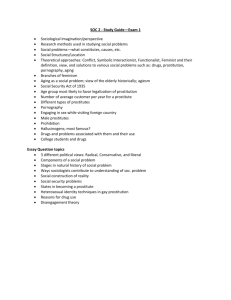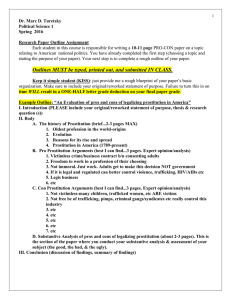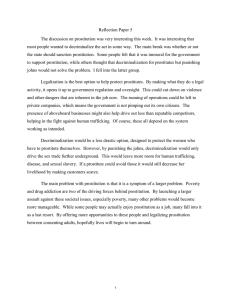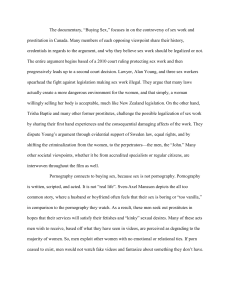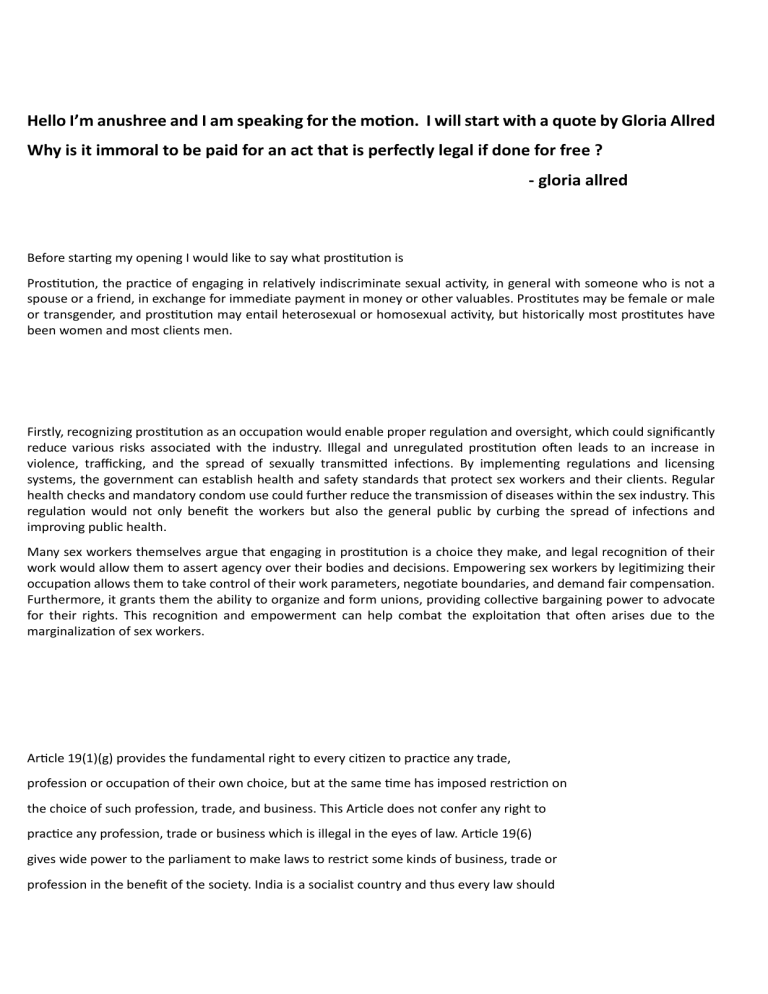
Hello I’m anushree and I am speaking for the motion. I will start with a quote by Gloria Allred Why is it immoral to be paid for an act that is perfectly legal if done for free ? - gloria allred Before starting my opening I would like to say what prostitution is Prostitution, the practice of engaging in relatively indiscriminate sexual activity, in general with someone who is not a spouse or a friend, in exchange for immediate payment in money or other valuables. Prostitutes may be female or male or transgender, and prostitution may entail heterosexual or homosexual activity, but historically most prostitutes have been women and most clients men. Firstly, recognizing prostitution as an occupation would enable proper regulation and oversight, which could significantly reduce various risks associated with the industry. Illegal and unregulated prostitution often leads to an increase in violence, trafficking, and the spread of sexually transmitted infections. By implementing regulations and licensing systems, the government can establish health and safety standards that protect sex workers and their clients. Regular health checks and mandatory condom use could further reduce the transmission of diseases within the sex industry. This regulation would not only benefit the workers but also the general public by curbing the spread of infections and improving public health. Many sex workers themselves argue that engaging in prostitution is a choice they make, and legal recognition of their work would allow them to assert agency over their bodies and decisions. Empowering sex workers by legitimizing their occupation allows them to take control of their work parameters, negotiate boundaries, and demand fair compensation. Furthermore, it grants them the ability to organize and form unions, providing collective bargaining power to advocate for their rights. This recognition and empowerment can help combat the exploitation that often arises due to the marginalization of sex workers. Article 19(1)(g) provides the fundamental right to every citizen to practice any trade, profession or occupation of their own choice, but at the same time has imposed restriction on the choice of such profession, trade, and business. This Article does not confer any right to practice any profession, trade or business which is illegal in the eyes of law. Article 19(6) gives wide power to the parliament to make laws to restrict some kinds of business, trade or profession in the benefit of the society. India is a socialist country and thus every law should be enacted by the parliament keeping in mind the welfare of the society. Thus, under Article 19(6) of the constitution of India, only those trade can be restricted which is against the socialist nature of the country i.e., which is against the benefit of the general public. The words incorporated in Article 19(1)(g) are trade, business, occupation, and profession. The main objective of this article is to know the validity of Prostitution under this Article. The job or the work of prostitution can be included (if needed) only in the word „Trade‟ and not any other word like occupation and profession. The word „trade‟ means exchange of goods for goods or goods for money or any business carried on with a view for profit, whether manual or mercantile distinguished from liberal arts or learned professions and from agriculture (Industrial Disputes Act, 1947). Exchange of goods for goods or for money with the object of making profits in the widest sense, it includes any business carried on with a view to earn profit. According to the immoral traffic(prevention) act of 1956 (ITPA) private prostitution is not illegal in India, but soliciting it, doing it publicly, and owning a brothel are illegal. IPC makes the following illegal: Soliciting prostitution services publicly Prostitution activities in hotels Prostitution by arranging for a sex worker Arranging a sexual act with a customer The three-judge Bench led by Justice L. Nageswara Rao said that sex workers are equally entitled to a life of dignity as guaranteed under Article 21 of the Indian Constitution. Expressing concern over the “brutal and violent” way that police treat sex workers, the court said that it is as if sex workers “are a class whose rights are not recognised. The police and other law enforcement agencies should be sensitised to the rights of sex workers who also enjoy all basic human rights and other rights guaranteed in the Constitution to all citizens.” . In the case budhadev karmaskar vs state of west Bengal Supreme court held that sex workers are human beings and should be treated with dignity and humanity according to sec 21 of the Indian constitution. In conclusion, recognizing prostitution as an occupation is a contentious but necessary step. Regulation and legitimization would not only improve the safety and well-being of sex workers but also address the demands and complexities of the industry. By adopting a pragmatic approach, societies can ensure that the rights and dignity of sex workers are protected, while also striving to eliminate exploitation and violence. It is essential to recognize and address the reality of prostitution rather than continuing to stigmatize and marginalize those involved. Effectiveness of Criminalization: Is there concrete evidence that criminalizing prostitution effectively reduces human trafficking, violence, and the spread of sexually transmitted infections? Rights and Agency: How can we balance the rights and agency of sex workers while addressing concerns about exploitation? Are there alternative approaches that empower sex workers without criminalization? Addressing Root Causes: Should the focus be on addressing the root causes, such as economic hardships, that lead individuals to sex work? Are there alternative economic opportunities that can be provided to vulnerable individuals? Ethical Considerations: How do we weigh ethical concerns about commodifying one's body against principles of autonomy and choice? Are there ways to mitigate these concerns without criminalizing sex work? International Perspectives: What can be learned from countries or regions that have taken different approaches to prostitution regulation? Are there successful models that strike a balance between protection and autonomy? Public Opinion and Values: How does public opinion on prostitution and societal values influence the debate? Should evolving social attitudes be considered in policymaking? These questions aim to prompt further discussion and examination of the complexities surrounding the issue of prostitution and its legal status.
